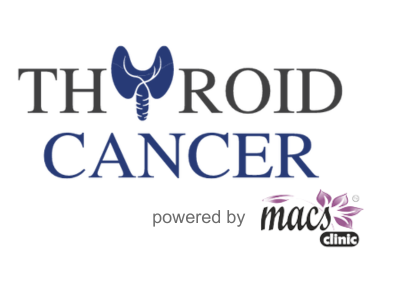Thyroid Surgery and Care Resource.
This website is expert resource on thyroid disorders by world renowned expert on thyroid surgery Dr Sandeep Nayak at MACS Clinic and KIMS Hospital, Bangalore, India
This website is expert resource on thyroid disorders by world renowned expert on thyroid surgery Dr Sandeep Nayak at MACS Clinic, Bangalore, India.
We have tried to make this site as a comprehensive information source for all thyroid problems that may require surgery and other added treatments. We have detailed pages about problems different types of thyroid nodules and cancers like papillary carcinoma, follicular carcinoma, etc. This site is provided by the MACS Clinic and Dr Sandeep Nayak, one of the world’s most renowned thyroid surgeons operating out of major hospitals located in Bangalore, India. Dr Nayak is known for the development of robotic thyroidectomy technique called RABIT which is used for thyroid cancer surgery. This site is constantly updated with new information.
Thyroid nodules are very common. The occurrence increases with age. Most of these nodules are benign. However, there is a small number that are cancerous. Thyroid cancer is relatively common cancer, but most thyroid cancers are very curable if the proper treatment is given. For an overview of Thyroid Cancer, the different types, who is more likely to get it and the prognosis, please see the specific pages dedicated to each of the cancer.
Though thyroid cancer is curable, your chance of cure is highest if your treatment is right. It is important to make the right choices in the beginning itself which includes choosing the right thyroid cancer surgeon.
This website is divided into multiple sections specific to different thyroid cancers and its management. There is a lot of important information for you, so that you can take an informed decision.
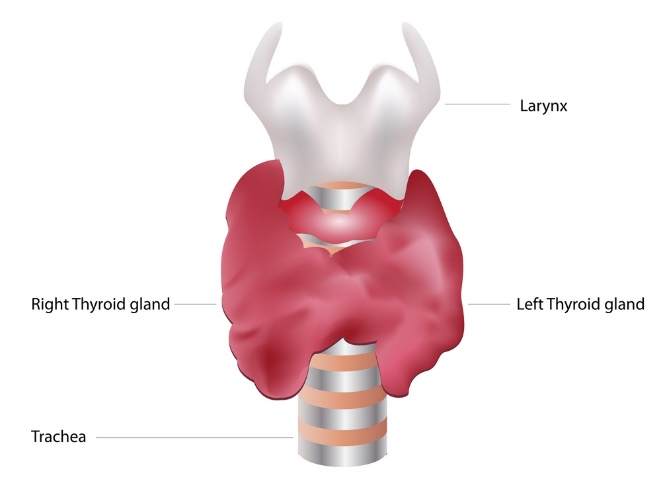
Have a Question?
We understand that the site has a lot of information and it can be hard to digest it all. If you have a question for us please feel free to contact us using this form and we’d be happy to help.
Thyroid Swellings or Nodules:
There are several causes for swelling of the thyroid gland. Each type of swelling or nodule has different requirements and outcomes.
Thyroid Nodule
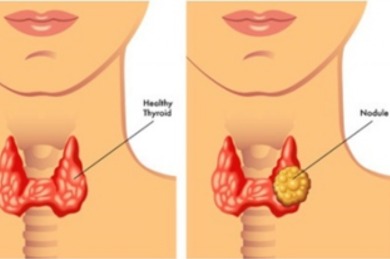
A thyroid nodule is a small abnormal growth within the thyroid gland. Most thyroid nodules are non-cancerous. Yet, thorough evaluation is essential to rule out any potential concerns or need for further medical intervention.
Thyroid Goitre
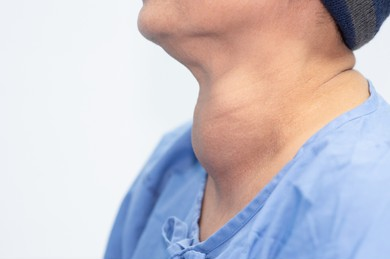
Thyroid goitre is a benign condition characterized by an enlarged thyroid gland. It may result from iodine deficiency or thyroid disorders. This condition can cause swelling in the neck and may impact thyroid function.
Substernal Goitre
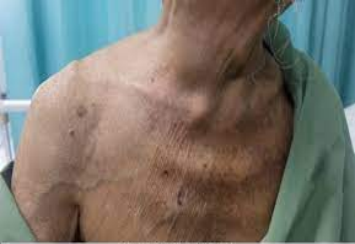
This type of goitre extends into the chest cavity and compresses organs. It causes pressure symptoms. This condition necessitates surgical intervention for proper management and relief of associated symptoms.
Types of Thyroid Cancer
You can start here to look at the different types of thyroid cancers. The treatment of each type of thyroid cancer differs based on the type and the outcomes also change based on the type.
- Papillary Thyroid Cancer: The most common thyroid cancer with the best outcomes.
- Follicular Thyroid Cancer: The second most common thyroid cancer with great outcomes.
- Hurthle Cell Thyroid Cancer: Less common, but a very good outcome of thyroid cancers if treated appropriately.
- Medullary Thyroid Cancer: A very rare type of thyroid cancer which also can be inherited in some individuals.
- Anaplastic Thyroid Cancer: A rare and very aggressive thyroid cancer.
Robotic Thyroid Surgery
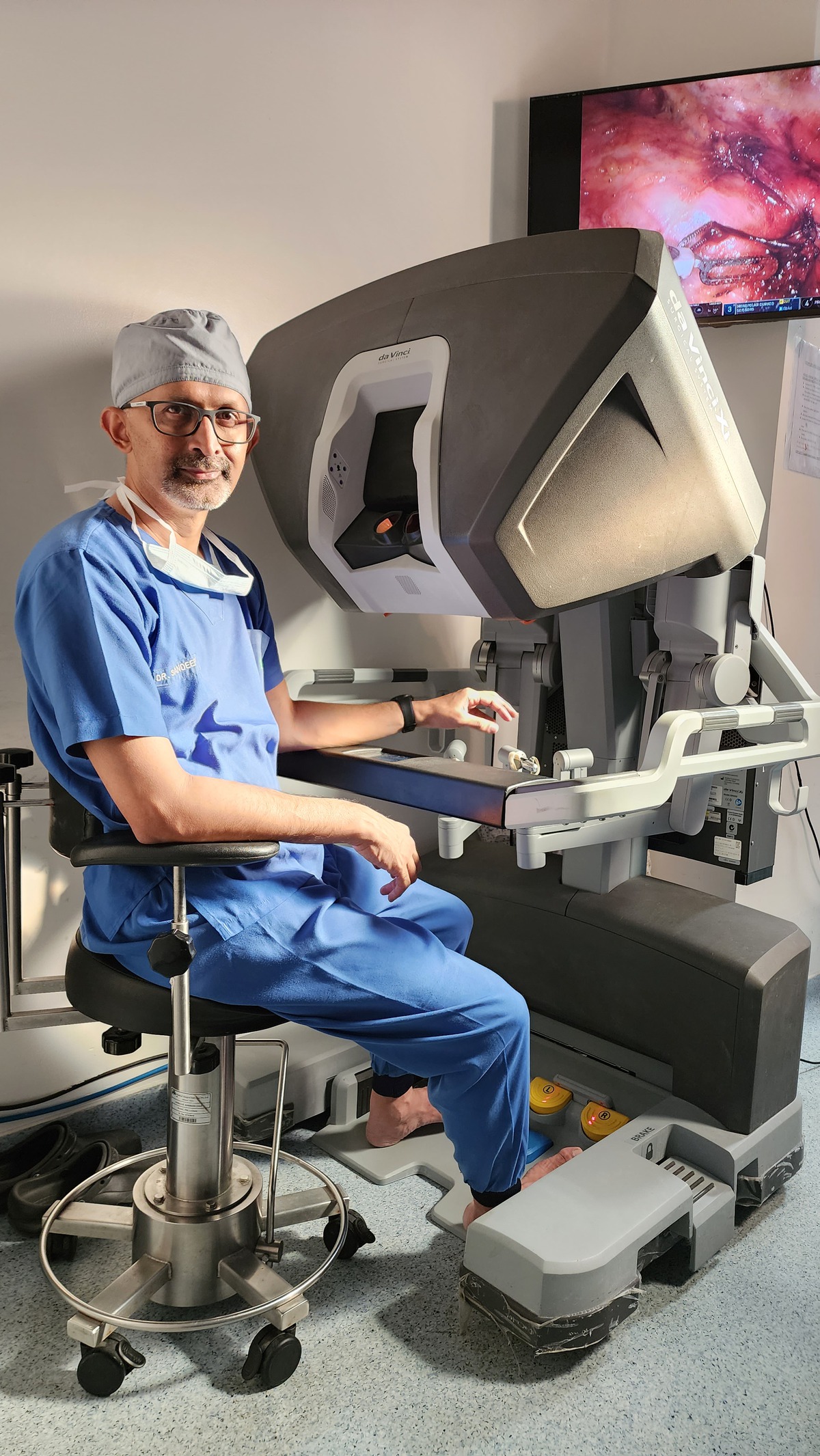
In picture Dr. Sandeep Nayak performing robotic thyroidectomy
Thyroid tumors often necessitate surgical intervention, particularly when there is a suspicion of cancer, pressure on adjacent organs, or when the gland extends into the chest, compressing surrounding structures. All types of thyroid cancer require surgery, which can lead to a cure.
Advancements in Surgical Techniques
One of the most modern and advanced techniques in thyroid surgery is robotic surgery. This approach was initially developed to minimize scarring on the neck. However, the introduction of the RABIT (Robotic Assisted Breast-axillo Insufflated Thyroidectomy) technique, innovated by Dr. Sandeep Nayak, has dramatically changed the landscape of thyroid surgery. This technique enhances surgical quality in the hands of experts and reduces certain complications. Notably, RABIT is a no-suture technique, meaning no foreign materials like stitches or clips are left in the body, unlike traditional open surgery
Clinical Outcomes
In our experience with 100 robotic thyroidectomies using the RABIT technique, we have not encountered any cases of nerve paralysis or parathyroid gland loss. This demonstrates a significant reduction in surgical complications, suggesting that this technique could revolutionize thyroid surgery practices globally.
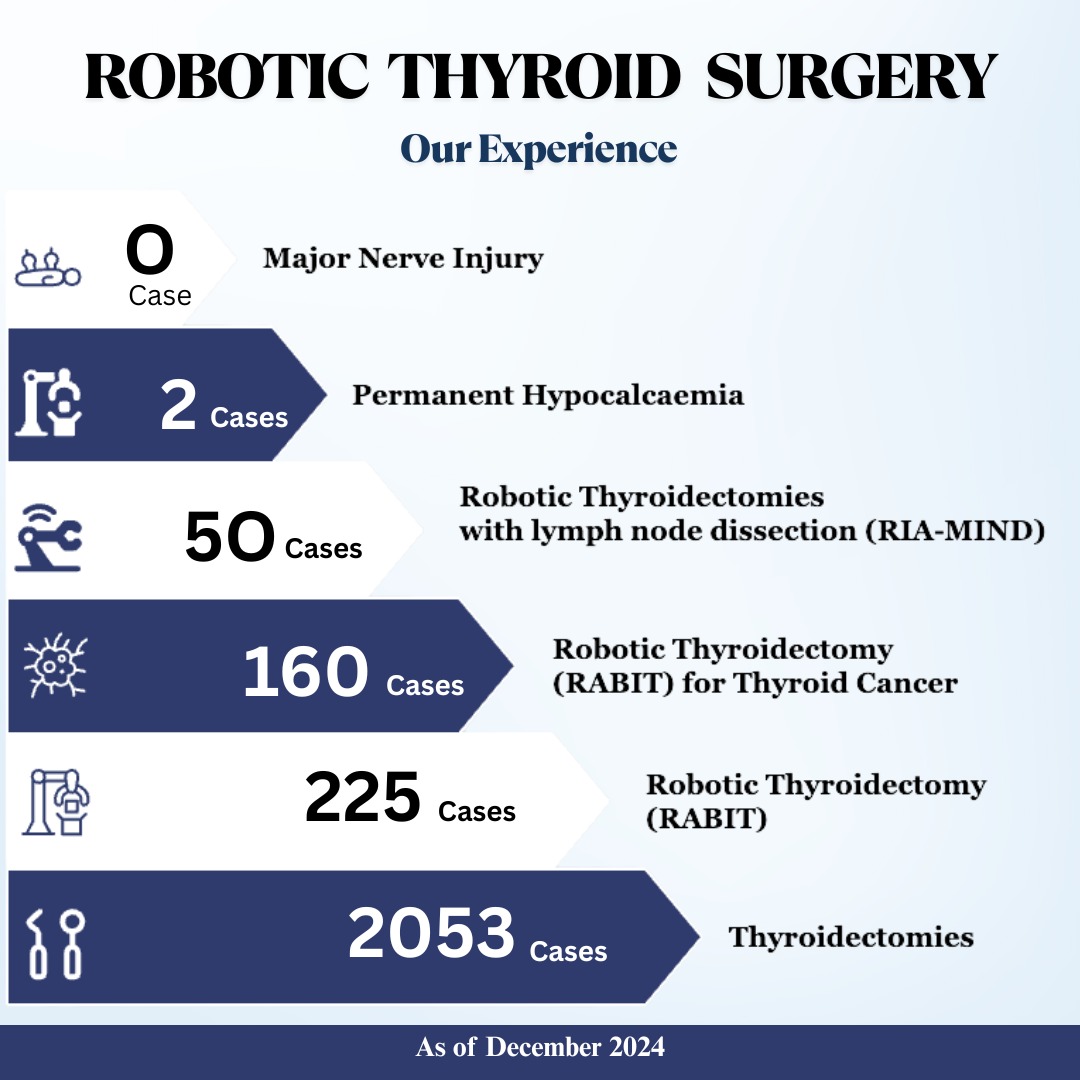
Robotic Thyroid-Surgery Outcomes — December 2024 Data
These data demonstrate a substantial case volume with an exceptionally low incidence of significant complications, underscoring the safety and efficacy of the centre’s robotic thyroid-surgery.Advantages of the RABIT Technique
The RABIT technique offers several benefits, including:
- No visible scar on the neck
- Minimal voice changes
- Reduced neck stiffness
- Faster recovery times
- Lower risk of calcium-related issues
- Improved outcomes when performed by experienced surgeons
These advantages position the RABIT technique as a leading option for thyroid surgery, promising better patient experiences and outcomes.

Total Thyroidectomy:
In cases where complete removal of the thyroid gland is necessary, as seen in most thyroid cancers, a total thyroidectomy is performed. This procedure ensures the removal of the entire thyroid while preserving parathyroid glands and vital nerves responsible for voice. It’s essential for this surgery to be conducted by experienced surgeons to minimize potential risks. Time taken for this surgery varies from case to case and complexity. This can be performed using robotic surgery or scarless endoscopic thyroidectomy in a effective and precise manor.
Hemi-thyroidectomy:
For some of the thyroid conditions removing half of the thyroid gland through a hemithyroidectomy is an adequate option. Hemithyroidectomy is performed in papillary thyroid cancers smaller than 1 cm in size. Otherwise this surgery is restricted to benign small tumors and toxic thyroid nodules. The procedure is designed to spare important structures like parathyroid glands and crucial nerves on at least on one side. It is advisable to opt for total thyroidectomy in most of the situations to avoid future problems. This procedure can be performed using robotic surgery (RABIT) or scarless endoscopic thyroidectomy.
Extended Complicated Thyroidectomy:
Reserved for advanced/aggressive thyroid cancers that have grown into adjacent structures, this uncommon surgical procedure demands the expertise of highly experienced thyroid surgeons. It involves intricate removal of cancerous growths in structures like nerves, the trachea, oesophagus, or blood vessels. May sometimes involve removing port of windpipe and rejoining.
Lymph Node Surgery:
Thyroid cancer operations may also include the removal of lymph nodes around the thyroid or in the neck. This is a crucial step in addressing the spread of cancer. Central compartment lymph node dissection can be performed robotically using the RABIT technique along with total thyroidectomy.
Functional Neck Dissection:
This procedure is employed for thyroid cancers that have spread to the lymph nodes in the neck. It meticulously removes cancerous growths while sparing uninvolved structures preserving the important blood vessels and nerves in the neck. The versatility of RABIT technique is that we can perform the entire lymph node dissection using the same wounds in a every effective and precise manor.
Thyroid Re-Operations or completion thyroidectomy:
In cases where the initial surgery did not fully address thyroid cancer or when the cancer has come back (recurrence), re-operations become necessary. Expert evaluation before surgery is crucial, and choosing an experienced thyroid surgeon is key to avoiding incomplete procedures. Completion thyroidectomy is required when hemithyroidectomy is performed and the final report suggests cancer. Recurrent or persistent thyroid cancer surgeries should only be performed by highly experienced surgeons.
By understanding the nuances of different thyroid surgeries and making informed choices, patients can ensure they receive the most effective and comprehensive treatment for their condition.
Radio-Iodine therapy:
Iodine is an essential element that plays a crucial role in the functioning of the thyroid gland. It naturally gets concentrated in the thyroid, allowing us to utilize this unique characteristic to effectively treat various thyroid conditions, including hyperthyroidism and thyroid cancer.
Cancers of thyroid gland can be effectively managed with radioiodine therapy following a total thyroidectomy. Thyroid cancers don’t require radiation or chemotherapy. This specialized treatment approach has proven to be highly effective, particularly for cancers larger than 1 cm in size. By utilizing radioiodine therapy, we can precisely target and eliminate cancerous cells, leading to improved outcomes and a higher quality of life for patients.
What to See Next
- Thyroid Cancer Videos: Videos of Dr Sandeep Nayak & team on various conditions of thyroid.
- Diseases of thyroid gland- an overview – An introduction to thyroid diseases.
How to Reach US!
Each year, our center welcomes many patients from all corners of the globe. With our extensive experience, we have streamlined the process to make it effortless for you to visit Bangalore for your evaluation, scans, biopsies, and surgery all in one trip. For your convenience, a significant portion of the follow-up can be conducted through online consultations. Additionally, we are committed to assisting you with postoperative treatment in your home country or city, eliminating the need for you to return to Bangalore, India.
Have a Question?
Frequently Asked Questions
What's the role of iodine in thyroid health?
Iodine is vital for thyroid hormone production. Iodine deficiency can lead to thyroid disorders. But, excessive iodine intake may also pose risks.
What causes thyroid cancer?
The exact cause is unclear. However, the following factors may increase the risk for thyroid cancer:
- genetic factors
- radiation exposure
- certain inherited conditions
Do all thyroid nodules need treatment?
No, many are harmless. Doctors assess nodules based on:
- their size
- symptoms
- potential malignancy risk
Are thyroid cancer symptoms noticeable?
Only sometimes. Watch for changes in voice, difficulty swallowing, or neck lumps. Regular check-ups enhance early detection.
Can thyroid cancer be prevented?
There is no foolproof prevention. However, managing risk factors and regular check-ups aid in early detection and successful treatment.
